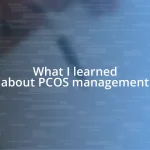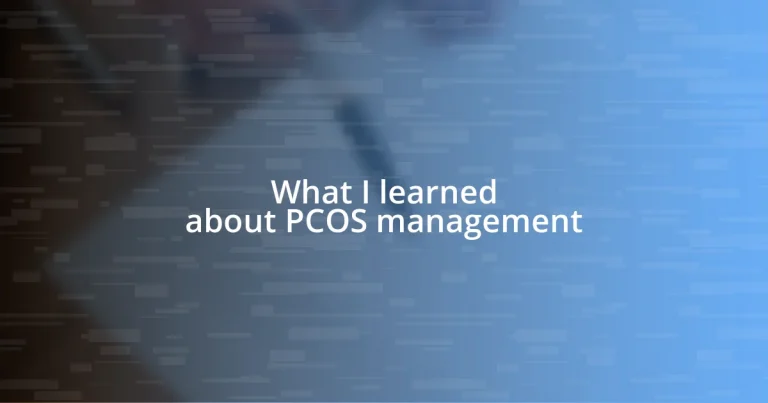Key takeaways:
- Early diagnosis of PCOS is vital for effective symptom management and long-term health outcomes, preventing issues like diabetes and improving psychological well-being.
- Dietary changes, such as adopting a low-glycemic diet and focusing on whole foods, can significantly enhance energy levels and overall health in those with PCOS.
- Integrating exercise routines, including HIIT, yoga, and strength training, along with tracking symptoms and progress, empowers women to manage PCOS more effectively.
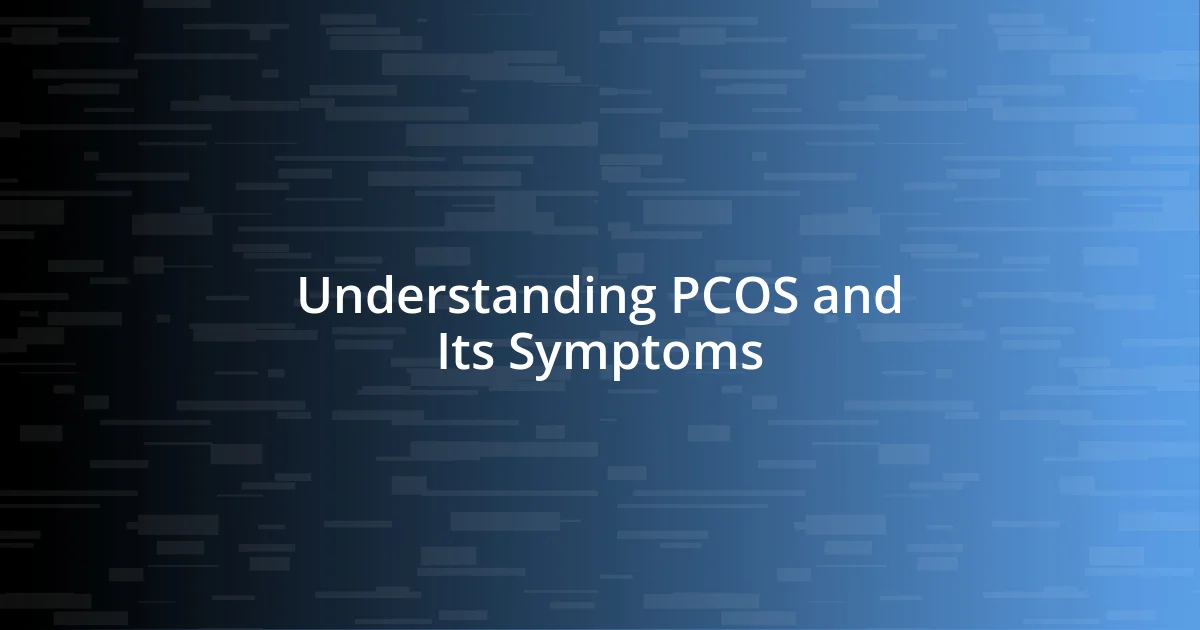
Understanding PCOS and Its Symptoms
Polycystic Ovary Syndrome (PCOS) is a hormonal disorder that affects many women, but the symptoms can often feel isolating. I remember feeling overwhelmed when I first learned that my irregular periods were just one piece of the puzzle—a puzzle that included weight fluctuations, acne, and excessive hair growth. Have you ever faced a mystery with so many pieces that you didn’t know where to start?
Understanding PCOS means recognizing how it manifests differently for each person. For me, it was the fatigue that sometimes felt crushing. I would ask myself, “Is this normal, or is something really wrong?” The truth is, symptoms like mood swings, thinning hair, and insulin resistance can impact both physical and emotional well-being.
It’s crucial to acknowledge that PCOS isn’t just a reproductive issue; it can influence many aspects of life, from mental health to lifestyle choices. Each symptom can feel like a wave of uncertainty, making it vital to connect with others who share similar experiences. I found comfort in those conversations, realizing I wasn’t alone on this journey. Have you found your support network yet?
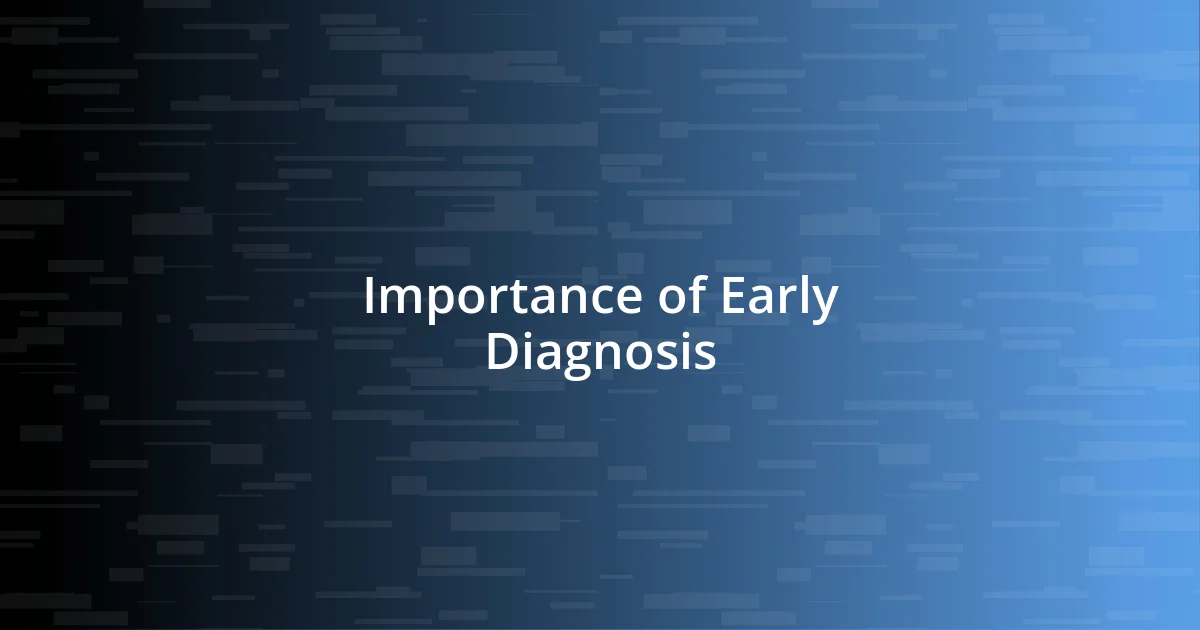
Importance of Early Diagnosis
Recognizing PCOS early can profoundly impact the quality of life and long-term health outcomes. When I was diagnosed, it felt like a weight had been lifted, but I realized that many women don’t get that clarity until years later. Early diagnosis not only allows for timely intervention but also means more effective management of symptoms and associated risks.
- Long-term health implications: Untreated PCOS can lead to serious issues like diabetes and heart problems.
- Better symptom management: Early intervention can help regulate cycles and manage symptoms more effectively.
- Psychological benefits: Knowing what to expect alleviates anxiety and fosters a proactive mindset towards health.
In my experience, understanding that I was dealing with a recognized condition enabled me to take control of my health journey. The relief of finally having answers helped diminish the self-doubt that had long burdened me. Discussing this with healthcare professionals sooner rather than later can pave the way for healthier and happier living.
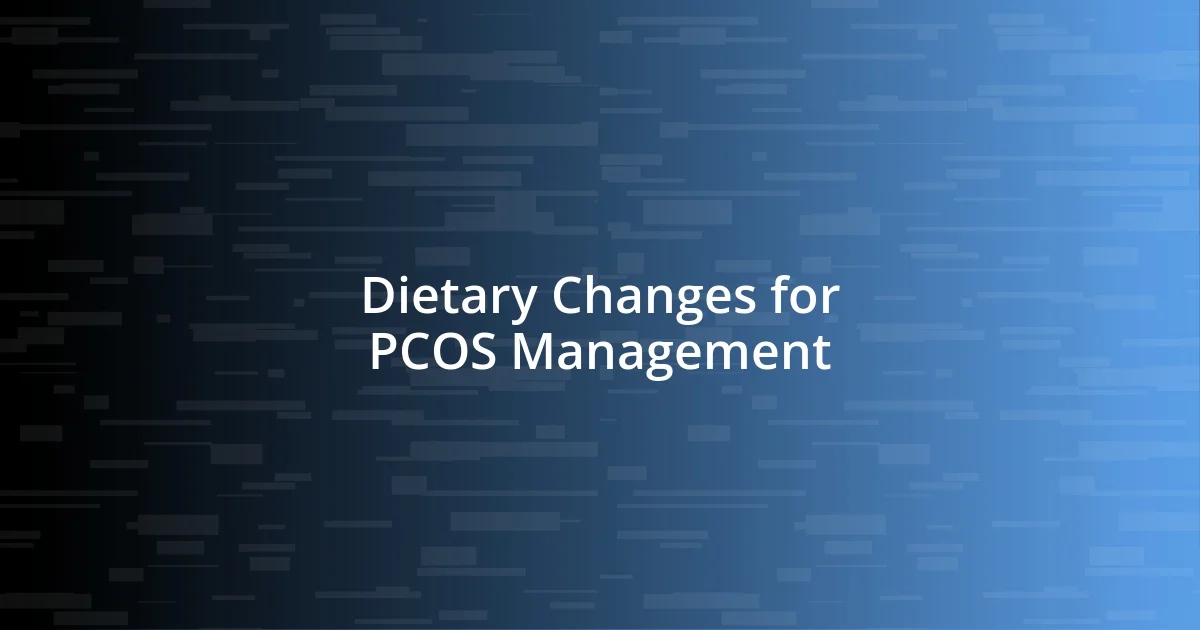
Dietary Changes for PCOS Management
Making dietary changes can be a game-changer for managing PCOS. Personally, adopting a low-glycemic diet was a revelation for me. Reducing foods that spike blood sugar, like white bread and sugary snacks, helped improve my energy levels and mood swings. It felt empowering to see how food choices influenced not just my body but also how I felt emotionally.
Incorporating more whole foods became a priority for my meals. Swapping processed snacks for fruits, nuts, and vegetables helped me feel satisfied and nourished. I remember one particular week when I tried meal prepping with quinoa salads and roasted veggies. Not only did it save time during the busy workweek, but it also brought a sense of stability to my eating habits. What small changes have you made in your diet that felt significant?
I also learned the value of balancing macronutrients in my meals. Adding protein and healthy fats helped me stay full longer, which reduced those pesky cravings. It’s fascinating how simple adjustments can lead to such profound effects. For example, I began pairing my meals with avocado or exploring plant-based proteins like lentils. These dietary shifts resulted in a more consistent energy level throughout the day and made a visible difference in how my body felt overall.
| Food Type | Recommended Choices | Avoid |
|---|---|---|
| Carbohydrates | Whole grains, legumes, fruits | White bread, pastries, sugary drinks |
| Fats | Avocado, nuts, olive oil | Trans fats, processed snacks |
| Proteins | Lean meats, fish, tofu | High-fat red meats, processed meats |
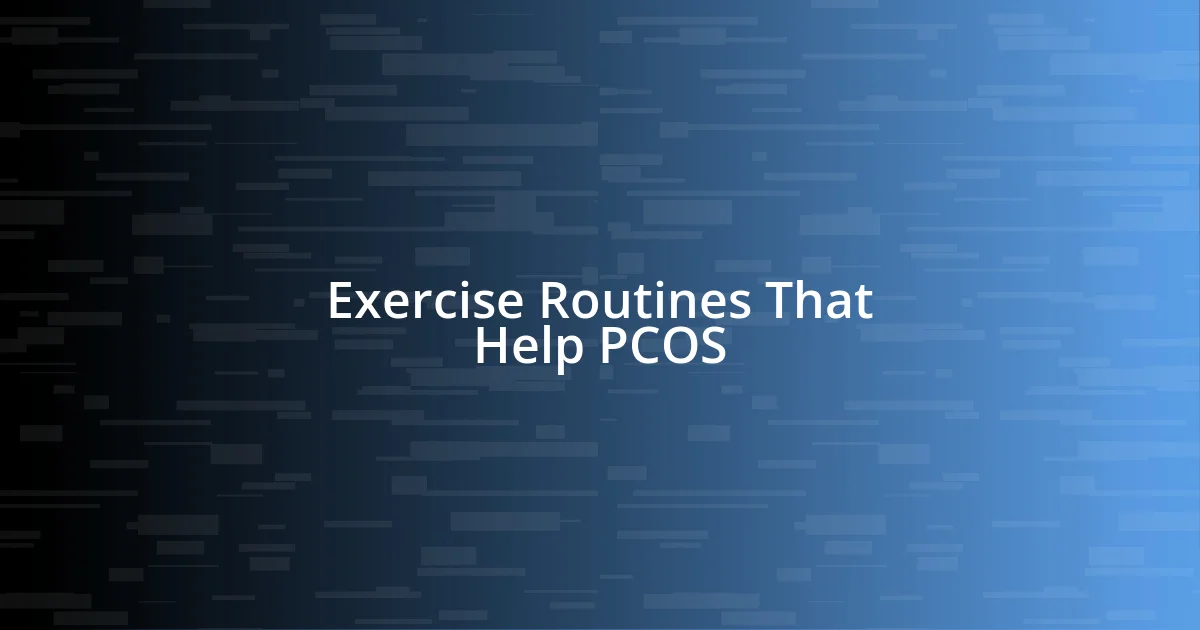
Exercise Routines That Help PCOS
Exercise is a crucial ally in managing PCOS, and I’ve found a few routines that made a lasting impact on my journey. Incorporating high-intensity interval training (HIIT) into my week not only spiked my energy but also significantly improved my insulin sensitivity. I remember sweating it out during those intense bursts of exercise, feeling powerful and accomplished when it was over. Has anyone else experienced that satisfying post-workout glow?
Listening to my body has taught me the importance of balance. While I loved the thrill of HIIT, I noticed the benefits of incorporating yoga and stretching into my routine, too. On days when I felt overwhelmed, a gentle yoga session not only calmed my mind but also eased my physical discomfort. I distinctly recall a session focused on deep breathing and relaxation, which felt like a mini-vacation amidst the chaos of life.
Another game-changing routine for me has been to include strength training. Lifting weights has not just toned my body but boosted my confidence. I still remember my first time challenging myself with heavier weights. That moment gave me a sense of achievement and control over my body. If someone had told me earlier that I would find empowerment in lifting weights, I might have laughed it off! Have you considered the potential of strength training in your life with PCOS?
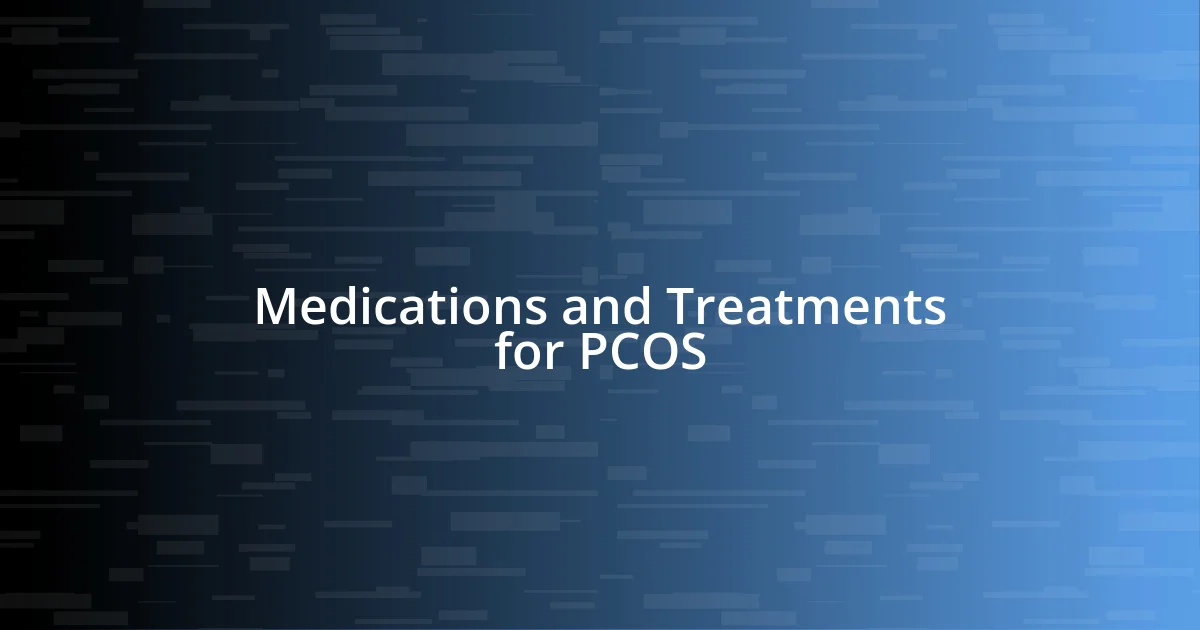
Medications and Treatments for PCOS
Medications play a pivotal role in managing PCOS symptoms, and finding the right one can feel like a journey of discovery. In my case, starting on birth control pills was a turning point. They helped regulate my menstrual cycle and also improved my skin—a double win! However, I learned quickly that not every medication suits everyone; what works for one person might not work for another. Have you ever experienced the trial and error of finding the right treatment?
Insulin-sensitizing medications, like Metformin, also made a significant impact in my experience. After incorporating it into my routine, I noticed a gradual change in my energy levels and reduced cravings. Initially, I felt apprehensive about taking a medication but soon realized it helped support my lifestyle changes rather than replace them. I often remind myself that medications can complement healthy habits, creating a powerful synergy in managing PCOS. How do you see the balance between medication and lifestyle in your own journey?
For those looking to manage symptoms without medications, there are natural supplements that may help. During my exploration, I came across inositol, which is often recommended for PCOS. I decided to try it out, and to my surprise, it seemed to enhance my mood and even regulate my cycles more consistently. I vividly remember feeling a sense of hope as things started to align. Have you explored any natural therapies or discussed them with your healthcare provider? Understanding all these options empowers us to find what truly works best for our bodies.
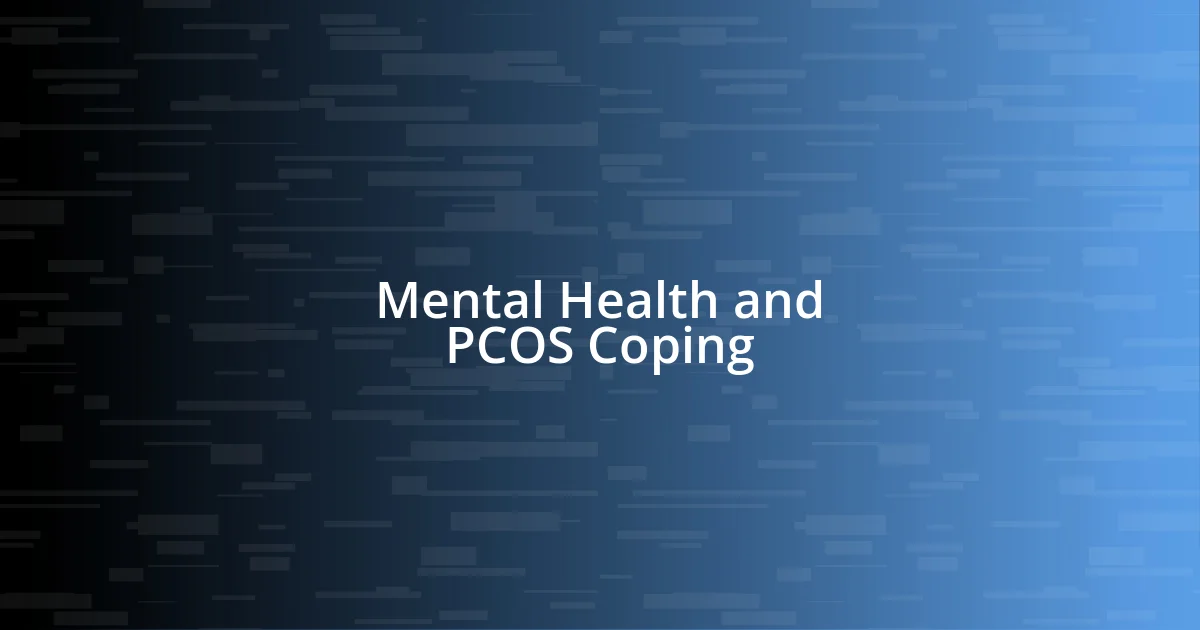
Mental Health and PCOS Coping
Managing PCOS can be an emotionally taxing journey, and I’ve often found that focusing on my mental well-being is just as crucial as physical health. There were days when the weight of my symptoms felt heavy, and I had to remind myself that it’s okay to feel overwhelmed. In those moments, journaling became my safe space. I poured out my thoughts, frustrations, and victories onto the pages, and it truly helped me process my emotions. Have you tried expressing your feelings through journaling or another medium?
Another strategy that has been beneficial for my mental health is nurturing a strong support network. I reached out to friends and joined support groups where others shared similar experiences. This connection made me realize that I wasn’t alone in my struggles, and it sparked uplifting conversations about coping strategies. There were times when just hearing someone else’s story inspired me to keep pushing forward. Isn’t it comforting to know that we can lean on each other when things get tough?
Mindfulness practices have also become a beacon of hope in managing my emotional ups and downs. I vividly recall one quiet morning when I sat outside, immersing myself in the sounds of nature—birds chirping, leaves rustling. The stillness allowed me to breathe deeply and shift my focus away from my worries. It’s these small moments that remind me of the power of being present, especially when PCOS symptoms can cloud my mind. Have you ever taken a mindful moment to disconnect and just be? Embracing those pauses can be incredibly healing.
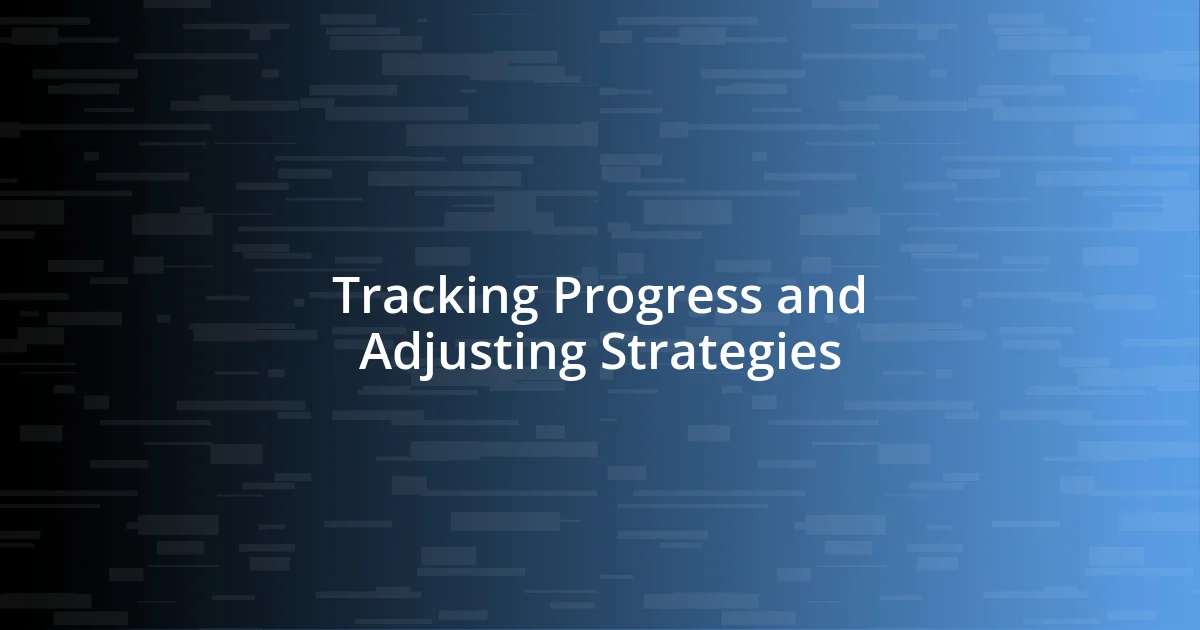
Tracking Progress and Adjusting Strategies
Keeping track of my progress was like holding a mirror to my journey. I started by using a simple app to log my symptoms, periods, and mood changes. Over time, I discovered patterns that helped me understand when my symptoms flared up. Isn’t it fascinating how data can reveal so much about our bodies? This insight was invaluable for making informed changes to my routine.
I realized that as I monitored my progress, I needed to be flexible with my strategies. One month, I might find my energy levels soaring, and the next, I’d feel drained. When something didn’t seem to work, I learned to adjust my approach without feeling defeated. For instance, after tracking my workouts, I noticed that yoga was particularly beneficial on stressful days. Have you ever had a moment where you adjusted your strategy and it made all the difference?
Reflecting on my journey, I found that regular check-ins brought clarity. I scheduled monthly reviews to assess what was working and what wasn’t. It was during these reflections that I celebrated small victories, like finally achieving more balanced cycles. Embracing the idea of evolution in my management plans became a source of strength. How do you reflect on and track your personal progress? Understanding that this journey is ongoing has truly empowered me.
